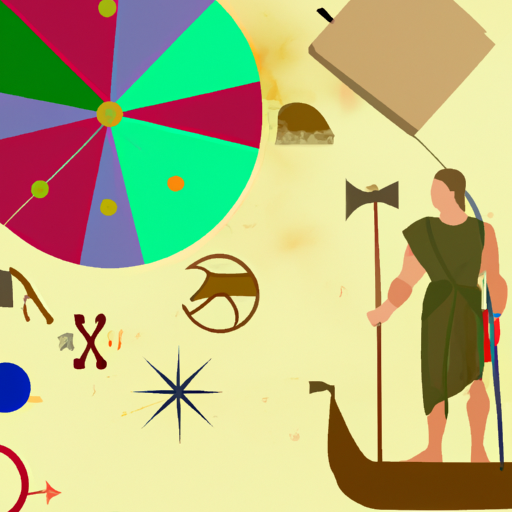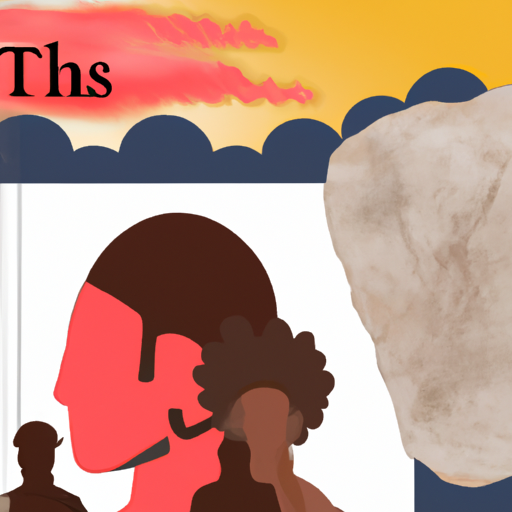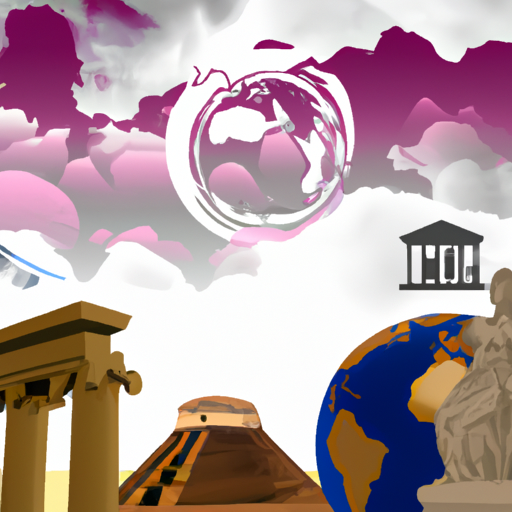A Look at the Historical Factors Behind Japan and China’s Strained Relationship
The past has left a chasm between Japan and China, but the opportunity to begin again still remains. With the potential for a fresh start, it could be possible to bridge the divide and form a new relationship. What was once broken may now have the ability to be mended.

Turbulent, tumultuous, and tangled. That’s the story of Japan and China’s relationship over the centuries. Despite their interwoven history, political and cultural disparities have led to a strained bond between them. But with a newfound hope for reconciliation, there’s potential for a new chapter in their relationship. Taking lessons from the past and looking forward to what lies ahead, these two nations could come together to create something stronger than ever before. A collaboration based on mutual understanding could be the key to unlocking a brighter future for both countries.
.
Introduction

An intricate and convoluted past has left a lasting impression on both Japan and China, leading to the current strained relationship between them. The root of this discord is the Japanese occupation of certain parts of China in the 1900s, a period that still lingers in the memories of both countries. Since then, numerous disagreements over land, resources, and unresolved grievances have arisen. Furthermore, the close ties Japan has with the United States are seen as a potential danger by some in China, exacerbating tensions between the two nations.
– Historical Disputes between Japan and China
A long-standing, complex relationship between Japan and China has been fraught with tension, with both sides having different understandings of the past. This has manifested in modern times as strained diplomatic relations and economic sanctions. One such dispute is over the Senkaku/Diaoyu Islands, which have been under Japanese control since 1895 but are also claimed by China. Since 1971, when the United Nations Economic Commission for Asia and the Far East suggested that they be returned to Chinese control, this issue has become a source of conflict between the two countries.
Another point of contention is that of war reparations from World War II. Japan had invaded parts of China during this time, resulting in much destruction to its people and infrastructure; after the war ended, Japan was required to pay reparations to China for its actions during the conflict, yet there remains disagreement on how much should be paid or if any payments should be made at all. To date, no agreement between the two countries has been reached on either matter.
The history between Japan and China is intricate and full of disputes that continue to impact their relationship today. Despite attempts at resolution through diplomacy and negotiation, many issues remain unresolved due to deep-rooted differences in interpretation from both sides’ perspectives. These historical issues will likely remain an obstacle in improving diplomatic ties between Japan and China for years to come.
– Impact of the Sino-Japanese War on Relations
A conflict of epic proportions, the Sino-Japanese War of 1894–1895 had far-reaching consequences that reverberated through history. The war, fought over control of Korea, saw Japan emerge triumphant and in possession of both Korea and two Chinese territories – Taiwan and the Liaodong Peninsula. This marked a major shift in the balance of power between China and Japan, with Japan now having an upper hand in East Asia.
The aftermath of the war was equally significant. Japan became increasingly assertive in its dealings with China, resulting in further conflicts over Manchuria and other areas. This only served to deepen the distrust between the two nations and set off a chain reaction that continued to plague their diplomatic ties for decades to come.
In sum, the Sino-Japanese War drastically changed Chinese-Japanese relations forever. It brought about a sudden alteration in East Asian geopolitics and initiated a cycle of military confrontations that strained bilateral ties long after the war’s end.
– The Role of World War II in Strained Relations
A tumultuous period of history, the reverberations of which are still felt today, World War II had a dramatic effect on international relations. Tensions that had long been simmering between countries were exacerbated by the war and its aftermath. Former allies such as France and Germany found themselves pitted against one another in a fight for power and resources, while new alliances formed during the conflict often led to further discord after it ended. The emergence of the Soviet Union as a superpower following the war sparked an ideological struggle with Western powers like the United States and Great Britain.
The displacement of millions of people during and after World War II resulted in a large refugee population without a home or nation to call their own, leading to conflicts over borders and territory that still exist today. The Cold War that followed added yet another layer of mistrust among nations that had previously been allies during the war.
In conclusion, it is clear that World War II continues to shape global politics even now; its legacy has left us with deep divisions between countries that have yet to be fully reconciled.
– Japanese Occupation of Chinese Territories
A dark period in history, the Japanese Occupation of Chinese Territories left an indelible mark on the region. From 1931 to 1945, Japan invaded and seized control of vast parts of China, including Manchuria which was rebranded as Manchukuo. This occupation was characterized by numerous atrocities and human rights violations, such as the Nanjing Massacre in 1937. To further bolster its authority, Japan also set up puppet governments in various areas of China.
The consequences were far-reaching; economic exploitation and disruption of traditional trade routes caused widespread poverty and famine across the nation. Many Chinese were also forced into labor camps or conscripted into military service for Japan, while freedom of speech and other civil liberties were suppressed to silence dissent against the occupying forces.
However, a resistance eventually emerged that ultimately led to Japan’s surrender in World War II and the end of its occupation in 1945. In its aftermath, China sought reparations from Japan for damages caused during its rule. Even today, tensions between these two countries remain due to unresolved issues stemming from this time period.
– Cultural Differences Rooted in History
Tracing back through time, it is evident that cultural differences are deeply entrenched in the past. From the ancient Egyptians to the present day, people have been shaped by their history and experiences. This can be seen in language, art, music, food and architecture – each reflecting a unique culture based on its own set of beliefs and traditions.
Take France for instance; the French Revolution was a major event in history that has had an enduring impact on French culture today. The French language is one of the most widely spoken languages in Europe due to its Latin roots and official status during the revolution. Similarly, traditional French cuisine has evolved over time but continues to retain its original flavors such as butter or cream sauces, long cooking times and rich flavors.
The United States too has a complex cultural heritage stemming from its founding fathers. Its diverse population has created a unique blend of cultures that is evident in clothing styles, music genres like jazz or hip-hop and even dishes like hamburgers or pizza which have been adapted over time to reflect different cultural influences.
Exploring our past provides us with valuable insight into how cultures have developed over time and why they differ from one another today. By examining our history we can gain an understanding of why different parts of the world view things differently and how these differences shape our present day societies.
conclusion

The tumultuous past between Japan and China has been a source of contention for many years, with its roots stemming from the events of World War II. Japan’s imperialist rule in parts of China resulted in numerous atrocities against those who lived there, leaving behind a legacy that continues to haunt the two countries today. More recently, the ongoing territorial disputes over islands in the East China Sea and Japan’s refusal to apologize for its wartime actions have only served to exacerbate tensions between them. It is clear that this long-standing history of hostility will continue to be a challenge for both nations as they strive to build better relations.
.
Some questions with answers
Q1: What is the history between Japan and China?
A1: The relationship between Japan and China dates back centuries, but has been strained in recent years due to a variety of issues, including territorial disputes and differing views on economic policy.
Q2: How did the current tensions start?
A2: The current tensions began in 2012 when Japan nationalized some disputed islands in the East China Sea, known as Senkaku by Japan and Diaoyu by China. This sparked a diplomatic crisis between the two countries which continues today.
Q3: Why do these historical tensions still exist?
A3: Historical tensions still exist because of unresolved issues from World War II. In particular, many Chinese people feel that Japan has not adequately apologized for its wartime actions or adequately compensated victims of Japanese war crimes.
Q4: What other factors contribute to the tension between Japan and China?
A4: Other factors contributing to tension include economic competition, differences in political systems, and cultural differences. Additionally, there are ongoing territorial disputes over islands in the East China Sea.
Q5: What can be done to improve relations between Japan and China?
A5: Improving relations between Japan and China will require dialogue and mutual understanding. Both sides need to be willing to compromise on sensitive issues such as territorial disputes. Additionally, both sides need to work together on economic cooperation projects that benefit both countries.




